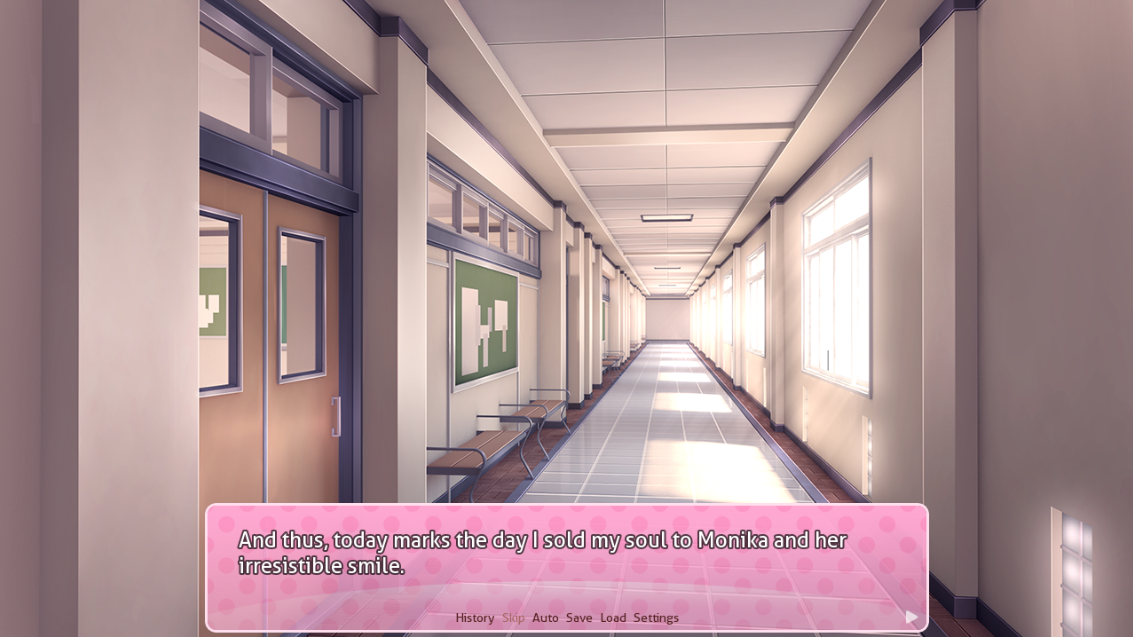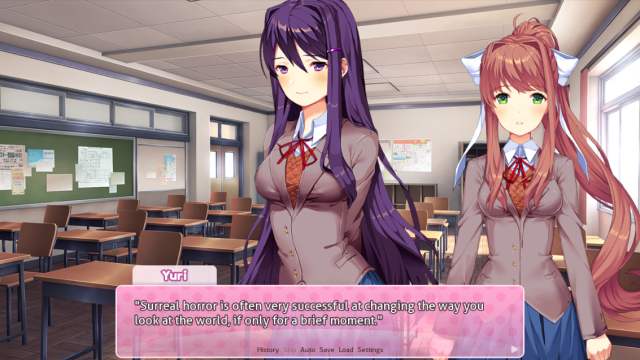Doki Doki Literature Club snuck up on everyone and became a cult hit. Dan Salvato, its writer and lead developer, played on the anime tropes present in its pink and cheery exterior to trick players into experiencing an unsettling story. “People might go into Doki Doki Literature Club making fun of it as a tropey anime game,” he said, “only to find themselves caring about the characters (and possibly very scared of them).”
Given its title, which includes the Japanese portmanteau for a beating heart, we already know that Dan Salvato is an anime fan. Deep within his Twitter feed you’ll find some screencaps of the mobile rhythm game Love Live, a anime and game series about cute popstars.
If you check out his YouTube page, there’s a perfect playthrough of one of the songs on the hardest difficulty. Although he’s clearly a huge anime fan, he described his relationship to the genre as “love/hate,” saying that he feels like the trope of “cute girls doing cute things”, can be both an asset and detriment to shows. Some people love the anime aesthetic, while others are very put off by it.
From there it’s not hard to divine the genesis of Doki Doki Literature Club, the surprise hit horror game that’s disguised as a cute visual novel about an after school club with adorable girls. Salvato said that he designed the game with both people who love cute anime girls and people who would never watch an anime starring clumsy doe eyed girls with pink hair.
Either way, you’re not going to get what you expected. Doki Doki Literature Club is actually a horror story, one that will freak you out whether or not you initially like these girls.
Doki Doki Literature Club is a dark game. It isn’t full of jump scares or horrifying images, but instead a growing sense that things are wrong and they’re not going to get better. Salvato has a knack for writing not just cute anime girls, but people with complex internal lives that they only give you glimpses of. It’s hard not to get connected to these characters, or to want to protect them from their grisly fates.

Dan Salvato
“I’m really inspired by experiences that are surreal, or unsettling, or things that kind of get under your skin”, he said. “Things that are scary because they make you uncomfortable, not because they shove scary-looking things in your face.” He cited Yume Nikki, Eversion, and Irisu Syndrome as games that he found particularly successful at creating that atmosphere.
In fact, he previously published a horror short story about a 19 year old girl who kills a random person on Thought Catalogue, saying, “you can see that ‘disturbing content’ is a recurring theme of mine.”
For a 25 year old, Salvato has a lot under his belt. He’s a former professional Super Smash Bros. player, and additionally created a popular mod for Melee, 20XX Tournament Edition, and contributed to the notorious Project M.
On top of that, he’s the creator of FrankerFaceZ, a Twitch extension that provides custom emotes and moderation tools. Doki Doki Literature Club is his first game, and he released it for free after working on it for two years in secret. After its release, it slowly but surely gained ground on Twitch and Youtube, and is now a cult hit.
“I think I understood that the game had some potential, because I usually have a pretty good understanding of the audience I design things for,” Salvato said. “But I never expected it to get this much attention. It’s really overwhelming, and heartwarming beyond what I can describe.”

It’s true that the game is scary, which usually makes for good Let’s Play material. Doki Doki Literature Club is also quite human, and speaks frankly on some sensitive subjects. When one character described her experiences with depression, it’s impactful because it doesn’t feel like a cheap way to garner sympathy. This empathetic writing seems to have contributed to its success. Salvato told me that he especially appreciated hearing from fans about these more serious themes.
“There are people who messaged me, telling me about how they suffer from depression, or how they lost a loved one to suicide”, he said. “I was so nervous about those things in the game being brushed off as just unnecessary cruelty. But getting those kinds of messages is incredibly touching, and they mean a lot to me”.
There’s a kind of sweetness and gentleness in Doki Doki Literature Club, but it’s hard won. Salvato describes the events of the game as “an inevitable tragedy” and acknowledged that the game is kind of nihilistic. “Nihilism doesn’t mean hopelessness”, he said.
“It means that you can make what you want out of your own life, out of the things you do have control over. I think I value providing that sort of feeling over a generic happy ending with complete closure. It might inspire the player to strive toward being a better person, doing the small things they know are in their power to make a difference.”
“People become disturbed when forced to think about things they don’t want to, or shown a reality that they always try to ignore”, he said. “But humans aren’t rational creatures. It’s when we’re emotionally charged that we become inspired to do something for ourselves, or for others”.

Comments
2 responses to “Doki Doki Literature Club’s Horror Was Born From A Love-Hate Relationship With Anime”
I know Japan loves portmanteaus, but “Doki doki” is onomatopoeia.
Games like DDLC are something I wish there were more of because I’m tired of the overabundance of games and movies catering to people’s wish for happy endings and perfect lives. The problem is that when you get things like this everyone down votes it because they think that acknowledging the side of life media tells us to ignore is a bad thing that you should hate.
What media are you watching that’s telling you to ignore unhappy endings? If anything, Hollywood just came out of a phase of movies with particularly dark or depressing endings, many of which were critically acclaimed. A random assortment off the top of my head would include Requiem for a Dream, 1984, Being John Malkovich, Oldboy, Twelve Monkeys, Shutter Island. Films like The Road were just oppressively bleak from start to finish. Television shows like The Walking Dead, Game of Thrones and Breaking Bad all inevitably destroy anything good and condition the viewer to expect the worst.
A little genuine positivity could do the world a bit of good, which is why a lot of people had high hopes for Star Trek Discovery, which thus far at least has been another example of focus on grit and human failings instead of the hope that Star Trek has always personified.
In my opinion Doki Doki Literature Club’s a great game, but more for its overall narrative and its twists rather than its endings.